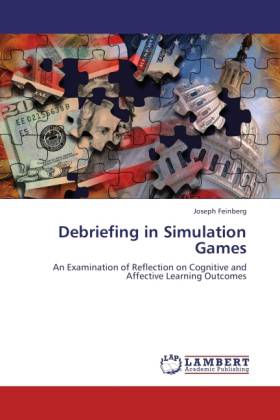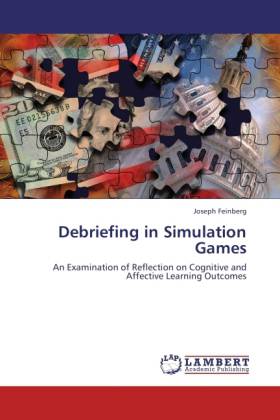
- Afhalen na 1 uur in een winkel met voorraad
- Gratis thuislevering in België vanaf € 30
- Ruim aanbod met 7 miljoen producten
- Afhalen na 1 uur in een winkel met voorraad
- Gratis thuislevering in België vanaf € 30
- Ruim aanbod met 7 miljoen producten
Zoeken
Debriefing in Simulation Games
An Examination of Reflection on Cognitive and Affective Learning Outcomes
Joseph Feinberg
Paperback | Engels
€ 58,95
+ 117 punten
Omschrijving
Debriefing is central to the experiential learning process, yet simulation game research studies seldom have focused on it. Properly designed simulation games with debriefing potentially provide a means to engage students in thoughtful, engaging, and worthwhile learning that is consistent with the contemporary goals of education. A small number of prior studies found debriefing had a positive effect on cognitive learning. However, the studies with positive results are too few and too contradictory as a result of problematic designs to warrant generalizations from the findings. The participants for this study were 238 students in state mandated economics classes. A variety of immediate and retention posttest measures were utilized to assess the levels of cognitive learning and interest on four randomly assigned alternative treatments. Data were analyzed by means of descriptive statistics, analysis of variance, and effect sizes. Findings from this sample supported previous research results that indicated debriefing has a positive immediate effect on cognitive learning. The implications of the results and suggestions for future research were discussed in detail.
Specificaties
Betrokkenen
- Auteur(s):
- Uitgeverij:
Inhoud
- Aantal bladzijden:
- 104
- Taal:
- Engels
Eigenschappen
- Productcode (EAN):
- 9783844318432
- Verschijningsdatum:
- 3/03/2011
- Uitvoering:
- Paperback
- Afmetingen:
- 150 mm x 220 mm
- Gewicht:
- 155 g

Alleen bij Standaard Boekhandel
+ 117 punten op je klantenkaart van Standaard Boekhandel
Beoordelingen
We publiceren alleen reviews die voldoen aan de voorwaarden voor reviews. Bekijk onze voorwaarden voor reviews.







